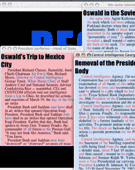Julia Kristeva's notion of intertextuality looks at the complex ways in which a given text is related to other texts. She claimed that every document is, in some way, a mosaic of other texts; every text is an absorption and transformation of others. Regime Change, the first of two, turbulence commissioned, textual instruments by Noah Wardrip-Fruin, Brion Moss, David Durand, and Elaine Froehlich, literalizes and plays on Kristeva's connections. Beginning with a news article excerpt on Iraq, from April 2003, participants hyperlink between short passages from the Warren Commission, and back again. Viewers-turned-performers then jump between layers, and can add text back into the pieces preceding them. Eventually, the generated, mosaic texts become familiar committee-speak, requiring only contemporary names for us to read them as any contemporary subject: the 9-11 commission, Osama = Saddam, Swift Boat Veterans for Truth... And one bonus for dedicated players: with enough interaction, Regime Change's behavior shifts slightly, allowing your intertext re-mix to include a bit of the unexpected in uncanny ways. - Nathaniel Stern


